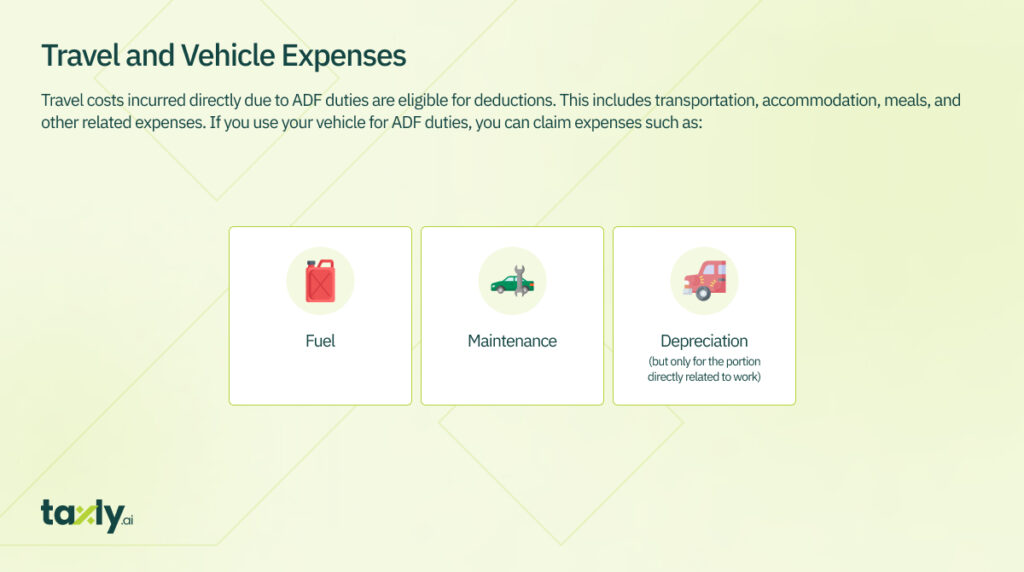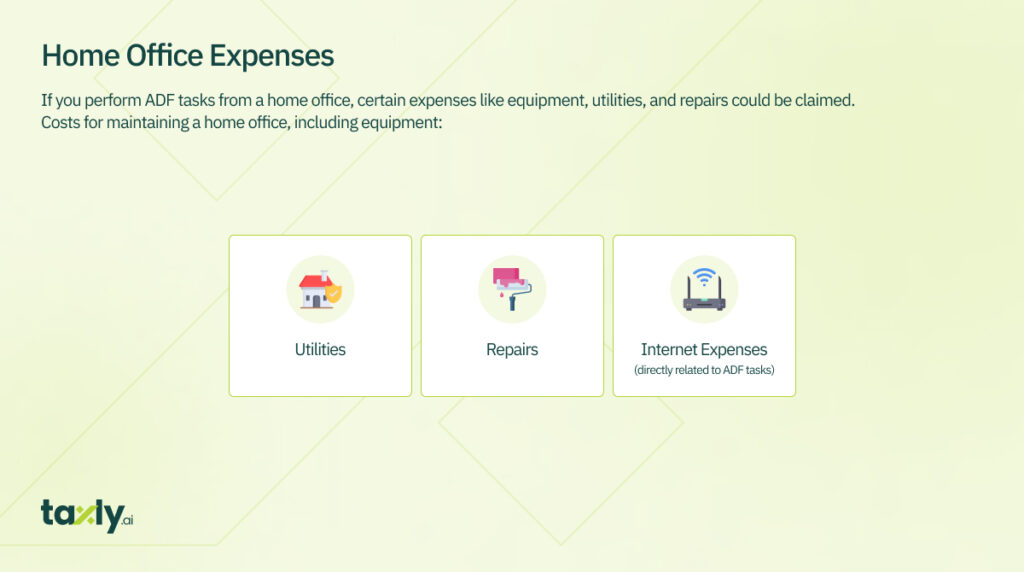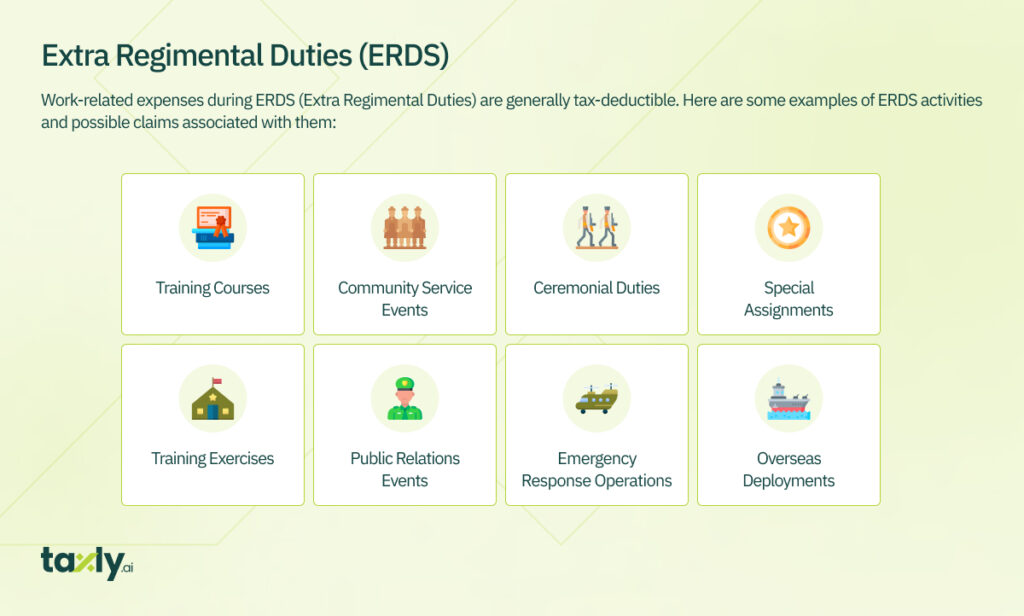Are you a serving member in the Australian Defense Force? You are eligible to claim tax deductions on several expenses. Your tax status will be similar to Australian Tax residents guidelines set by ATO. In this guide, I will share:
- What are eligible expenses for ADF Tax deductions?
- Information about ADF Allowances and deductions?
- What are ADF Tax rates for 2023-24?
- Expense record keeping guidelines
- ADF Tax offsets
ADF Tax Deductions
Australian Defence Force (ADF) members can claim various tax deductions on their annual returns. These deductions can be claimed for expenses directly related to their ADF duties. Let me break down some possible deductions for you:
Clothing and Uniform Expenses:
ADF members can claim expenses related to the purchase, maintenance, repair, and laundry of their military uniforms. Remember, these deductions are for items specified by the ATO as compulsory uniform pieces.
- Purchase, maintenance, repair, and laundry costs for military uniforms.
- Expenses for official shirts, trousers, jumpers, jackets, hats, shoes, and socks.
- Dry cleaning and repair costs for uniforms.
Protective Clothing and Footwear:
If you use protective gear to reduce the risk of injury or illness during work-related tasks and the ADF didn’t provide them, you may claim the expenses.
Claim Costs for
- Fire-resistant clothing.
- Safety boots.
- Protective gloves.
- Aprons, and smocks used for work purposes.
Tools and Equipment:
Any tools or equipment necessary for ADF duties could be claimed, but only for the portion used for work purposes.
Travel and Vehicle Expenses:
Travel costs incurred directly due to ADF duties are eligible for deductions. This includes transportation, accommodation, meals, and other related expenses.
If you use your vehicle for ADF duties, you can claim expenses such as:
- Fuel.
- maintenance, and depreciation, but only for the portion directly related to work.

Calculation Method #1: Actual Expenses Method:
With this method, you claim the exact amount you spent on work-related travel expenses. It includes everything from public transport fares and plane tickets to accommodation costs and meals.
To claim using this method, you need to keep detailed records and receipts for all your expenses. This means holding onto receipts for things like transport, accommodation, meals, and any other costs directly related to your work-related travel.
The actual expenses method is precise but requires meticulous record-keeping to substantiate your claims.
Calculation Method #2: Cents per Kilometre Method:
Alternatively, you can use the cents per kilometre method. This method provides a standard rate per kilometre traveled for work purposes. You simply multiply the number of business kilometres by the applicable rate.
The ATO sets the standard rate for cents per kilometre, and it covers costs like fuel, depreciation, and maintenance.
While this method is simpler in terms of record-keeping since you don’t need to retain every receipt, you still need to keep track of your business kilometres.
You may be required to provide evidence of how you calculated your business kilometres, such as a diary or other documentation.
Home Office Expenses:
If you perform ADF tasks from a home office, certain expenses like equipment, utilities, and repairs could be claimed. Check out our complete guide of Work from home Tax Deductions.
Costs for maintaining a home office, including equipment:
- Utilities.
- Repairs, and internet expenses directly related to ADF tasks.

For Example: Purchase of a computer for performing administrative tasks related to ADF duties at home.
Mess Fees:
You can claim a portion of compulsory mess subscriptions related to work activities.
ADF Self Education and Training Expenses
For self-education and training expenses to be eligible deductions for Australian Defence Force (ADF) members, they must be directly related to your current role and income-earning activities within the ADF. Here are examples of eligible deductions for self-education and training:
Course Fees:
Fees paid for courses, seminars, workshops, or training programs directly related to your ADF duties.
This includes tuition fees for formal education courses undertaken to enhance your skills and knowledge in your role.
Textbooks and Study Materials:
Costs associated with purchasing textbooks, manuals, and other study materials required for your ADF-related education or training.
Travel Expenses:
Travel expenses incurred while attending educational or training programs directly related to your ADF duties.
This includes costs for transportation, accommodation, meals, and other travel-related expenses.
Equipment and Tools:
Expenses for purchasing equipment, tools, or technology necessary for your ADF-related education or training.
This may include computers, software, uniforms, and specialized gear required for training courses.
Subscriptions and Memberships:
Costs associated with subscriptions to journals, magazines, or professional memberships directly relevant to your ADF role.
This could include subscriptions to industry publications or memberships in professional associations related to your field.
Home Office Expenses:
Expenses for maintaining a home office used for studying or completing ADF-related coursework.
This may include costs for internet access, phone bills, utilities, and office supplies.
Conferences and Seminars:
Costs associated with attending conferences, seminars, or training courses that enhance your skills and knowledge relevant to your ADF position.
Physical Training Fees
Only if your role demands a fitness level beyond standard ADF requirements.
Extra Regimental Duties (ERDS):

ERDS stands for Extra Regimental Duties, which refers to additional tasks or responsibilities undertaken by Australian Defence Force (ADF) members beyond their regular duties. Work-related expenses during ERDS are generally tax-deductible. Here are some examples of ERDS activities and possible claims associated with them:
- Training Courses:
Expenses related to attending specialized training courses relevant to ADF duties.
Course fees, travel expenses, accommodation, and meals incurred during training sessions.
- Community Service Events:
Costs associated with participating in community service events or volunteering activities organized by the ADF.
Travel expenses, meal costs, and any necessary equipment purchases.
- Ceremonial Duties:
Expenses for participating in ceremonial events, parades, or official functions.
Uniform maintenance costs, transportation expenses, and other incidental expenses related to ceremonial duties.
- Special Assignments:
Costs incurred while undertaking special assignments or missions outside of regular duty stations.
Travel expenses, accommodation, meals, and any required equipment or supplies.
- Training Exercises:
Expenses related to participating in training exercises or simulations.
Travel costs to exercise locations, accommodation, meals, and any specialized gear required for the exercise.
- Public Relations Events:
Costs associated with representing the ADF at public relations events or media engagements. You can also claim Travel expenses, uniform maintenance, and other related expenses.
- Emergency Response Operations:
Expenses incurred during emergency response operations, such as firefighting or disaster relief efforts. Travel costs, accommodation, meals, and equipment purchases necessary for the operation.
- Overseas Deployments:
Expenses related to overseas deployments, including travel, accommodation, meals, and any additional expenses incurred while deployed.
Allowances and ADF Tax Deductions
For Australian Defence Force (ADF) allowances, certain expenses are eligible for deductions on your tax return. Here’s a breakdown of potential deductions for various ADF allowances:
- Flying Allowance:
Expenses related to professional development or training directly related to flying duties.
Costs for flight gear, manuals, subscriptions to aviation publications, and other related expenses.
- Language Proficiency Allowance:
Expenses for language courses or training materials directly related to improving language proficiency required for ADF duties.
Course fees, textbooks, and travel expenses for language immersion programs or training sessions.
- Special Action Forces Allowance:
Costs associated with maintaining physical fitness and readiness for special action duties.
Gym memberships, fitness equipment, training courses, and other related expenses.
- Uniform Maintenance Allowance:
Expenses for maintaining and repairing uniforms required for ADF duties.
Dry cleaning costs, uniform repair expenses, and other related maintenance costs.
- Vehicle Allowance:
Costs related to using a personal vehicle for ADF duties, if the allowance does not fully cover these expenses.
Fuel costs, maintenance and repairs, insurance, and depreciation associated with using the vehicle for work purposes.
How to Keep Records for Work Expenses
In order to claim deductions for work-related expenses, it’s imperative to maintain accurate records to substantiate the costs incurred and demonstrate their relevance to your employment income. Here’s a summary of the guidelines for keeping records:
- Receipts and Documentation:
- Records typically consist of receipts, although other forms of written evidence, such as invoices, are acceptable.
- Exceptions apply to small expenses ($10 or less), hard-to-obtain receipts, travel allowance expenses, and overtime meal allowance records.
- Required Information:
- Receipts or documents from suppliers should include:
- Name or business name of the supplier.
- Amount of the expense or cost of the asset.
- Nature of the goods or services purchased.
- Date of purchase.
- Date the document was produced.
- Expenses incurred in Australia must be documented in English.
- Receipts or documents from suppliers should include:
- Threshold for Documentation:
- If your total claim for work-related expenses exceeds $300, written evidence is required for all claims.
To access a detailed summary of work-related expense record-keeping guidelines, you can download the document titled “Keeping records for work-related expenses” (PDF, 344KB) from the provided link.
Maintaining thorough and organized records ensures compliance with tax regulations and facilitates the process of claiming deductions on your tax return.
ADF Resident tax rates 2022–23
| Taxable income | Tax on this income |
| 0 – $18,200 | Nil |
| $18,201 – $45,000 | 19 cents for each $1 over $18,200 |
| $45,001 – $120,000 | $5,092 plus 32.5 cents for each $1 over $45,000 |
| $120,001 – $180,000 | $29,467 plus 37 cents for each $1 over $120,000 |
| $180,001 and over | $51,667 plus 45 cents for each $1 over $180,000 |
For the most up to date information, visit the ATO website
Example: If you earned $80,000 per year, your tax would be calculated like this:
| Taxable income | Tax payable | |
| $18,200 | Nil | =$0 |
| $26,800 ($45,000 – $18,200) | x 19c | = $5,092 |
| $35,000 ($80,000 – $45,000) | x 32.5c | = $11,375 |
| Total: $80,000 | Total: $16,467 | |
ADF Tax Offsets
Australian Defence Force (ADF) tax offsets are specific benefits provided to ADF members to reduce their tax liabilities. These offsets are designed to recognize the unique circumstances and challenges faced by ADF personnel. Here’s an elaboration on ADF tax offsets:
#1 Zone Tax Offset (ZTO):
The Zone Tax Offset is available to individuals who live and work in remote or isolated areas of Australia, including certain regions where ADF bases are located.
ADF members stationed in designated remote zones may be eligible for the Zone Tax Offset, which provides tax relief to compensate for the higher cost of living and working in these areas.
The offset amount varies depending on the specific zone in which the individual resides and works. It’s calculated based on factors such as the location and duration of residency.
#2 Overseas Forces Tax Offset (OFTO):
The Overseas Forces Tax Offset is available to ADF members who are deployed overseas for their duties. This tax offset recognizes the unique circumstances of ADF members serving overseas, including the challenges of living and working in foreign countries.
The offset amount is based on the duration and location of overseas deployment. ADF members who serve overseas for a certain period may be eligible for a full or partial tax offset to reduce their tax liabilities.
Both the Zone Tax Offset and the Overseas Forces Tax Offset aim to alleviate the financial burden on ADF members by providing tax relief based on their specific circumstances. It’s important for ADF personnel to understand their eligibility for these offsets and to claim them appropriately when filing their tax returns. Additionally, consulting with a tax advisor or accountant can help ensure that ADF members maximize their tax benefits while remaining compliant with tax laws and regulations.
Maximize your Eligible ADF Tax Deductions Using Taxly.Ai!
Harness the power of AI to optimize your tax savings effortlessly! Taxly.AI, our cutting-edge tax assistant, is designed specifically for Australian Defence Force (ADF) members like you. With Taxly.AI, you can:
Our AI-powered assistant automatically scans through your expenses to uncover all eligible deductions related to your ADF duties.
Taxly.AI meticulously reviews your expenses and ensures that you claim every deduction you’re entitled to, helping you maximize your tax savings.
Say goodbye to tedious paperwork! Taxly.AI simplifies the entire process by organizing your deductions and generating accurate reports for your tax return.
Taxly.AI stays up-to-date with the latest tax laws and regulations, ensuring that you remain compliant while maximizing your deductions.
Take the stress out of tax season and let Taxly.AI revolutionize the way you file your taxes. Sign up today and experience the convenience of effortless tax optimization tailored to ADF members!


Comments are closed